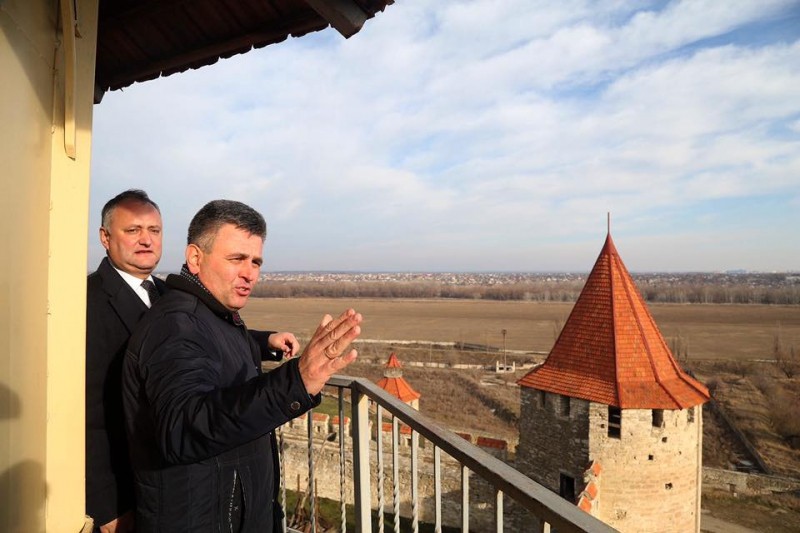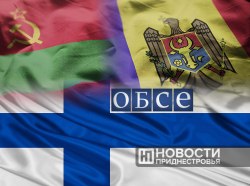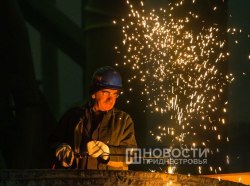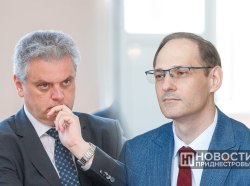The meeting that took place in Bendery on 4 January 2017 has come into the view of nearly all leading Russian media — First Channel, RIA Novosti, RBC, Kommersant, RT. Some of them have called it historic. And probably not without good reason — the presidents of the PMR and Moldova had not met for eight years. The last meeting took place on 24 December 2008 when the presidents were Vladimir Voronin and Igor Smirnov. Nicolae Timofti, when the head of Moldova, did not show much interest in Pridnestrovie (as well as in many other things), remembering it only when it was necessary to make another statement on the withdrawal of Russian troops.
It was difficult therefore to expect that the first in many years meeting of the presidents would result in any instant and comprehensive breakthrough. However, Vadim Krasnoselsky and Igor Dodon did not just shake hands and, as they say, «established contact» but also touched upon the issues that remained unresolved in 2016. Among them were the recognition of Pridnestrovie-issued university diplomas and licence plates, land disputes, problems of railway communication through the PMR, review of criminal cases initiated for political reasons against Pridnestrovians. The fact that the new presidents moved on at once to specific problems is definitely positive.
It is also positive that the Moldovan side did not employ this time its traditionally negative rhetoric about the peacekeeping operation in the Dniester region. On the contrary, Igor Dodon emphasised that the work of the chief peacekeeping body — the Joint Control Commission — must be unblocked.
In general, it became evident following their briefings that both Dodon and Krasnoselsky were satisfied with the outcome of the first meeting and would like to build on its success with regard to socio-economic problems. As noted by TASS, the Moldovan president, for instance, expressed hope for a new meeting focusing on specific decisions and terms for their implementation. «The task has been set — the citizens from both Dniester banks must see concrete results during 2017," the head of Moldova wrote on Facebook.
And here come a number of questions. The main of them is how Igor Dodon will be able to ensure the implementation of these decisions. This question does not concern Vadim Krasnoselsky as he has the full-fledged constitutional powers of the president. As for the post of the president of Moldova, it is, as the leader of the Democratic Party of Moldova, Vlad Plahotniuc, described it in his recent message to Donald Trump, a «ceremonial … post with limited constitutional authority and scant influence over foreign policy.» That is, there is an imbalance of the presidential powers and corresponding abilities.
It is quite possible that Igor Dodon wants to get things going in the Moldo-Pridnestrovian settlement. Just anything. But even today it is clear that any attempt to do so will face obstruction of the majority of the Moldovan political class. This will concern even such simple things as the recognition of diplomas issued by Pridnestrovian State University.
There are already the first signs of misunderstanding between Dodon and the ruling majority. According to the honorary chairman of the Democratic Party, Dumitru Diacov, the Moldovan president is making «numerous statements» on Pridnestrovie «that are too generous and optimistic.» It seems as if Dodon insists on his proposals to bring the Dniester banks closer together, we will hear even more sharp condemnation from the Moldovan politicians and officials close to the ruling coalition.
The right-wing opposition, led by Maia Sandu, is now directly accusing the president of flagrant violations of the Moldovan constitution, claiming that he proposes «false solutions to the issues outside his competence.» And this may well lead to street protests.
Dodon is unlikely to be understood by Moldova's expert community as well. Moldovan political experts and civil society representatives, especially those close to the current authorities and right-wing parties, are condemning the president for his calls to admit the guilt of the Moldovan authorities in unleashing the 1992 war. And almost all of them stand against any significant compromises in relations with Pridnestrovie.
In general, in our opinion, despite optimism prevailing after the first meeting, Igor Dodon and Vadim Krasnoselsky will have to overcome many difficulties to achieve any visible result in 2017. And these difficulties will come from the Moldovan side. It may happen that it will be far more difficult for Dodon to come to an agreement with his «own» government in Kishinev rather than with Pridnestrovie.
It should also be noted that solving even such simple issues as the recognition of Pridnestrovie-issued university diplomas or licence plates is likely to require the will of European mediators who first of all can influence Moldova's ruling coalition. But at the same time, their will may not suffice. As is known, Germany's OSCE chairmanship, which seemed very promising and perspective at the beginning of 2016, has failed by and large to achieve any result in Kishinev.
Pavel Uvarov.








